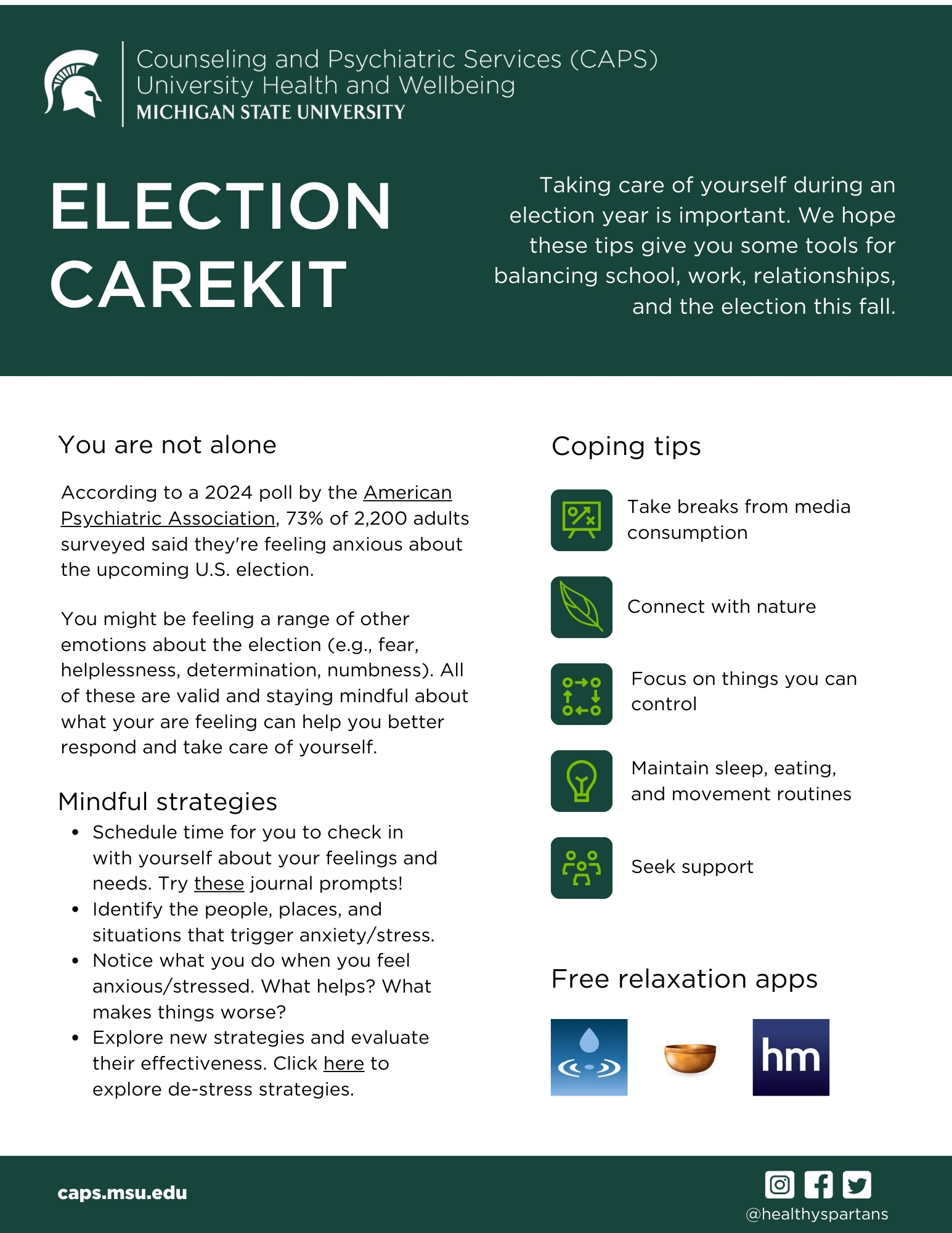As we count down the final few days until the U.S. election, many Spartans may be feeling the weight of anxiety and stress, wondering what the future may hold. With heated debates, constant news cycles and living in a battleground state, University Health and Wellbeing wants you to know it’s easy – and normal – to feel overwhelmed.
Leigh Norwood, executive director of University Health and Wellbeing Mental Health and Trauma Support Services, wants you to remember, “You have the power to choose how you engage with this information, and there are effective self-care and mindfulness strategies to help you find calm amidst the chaos to bring your mind and body back to a calm state.”
Whether you are a student, employee or alum, juggling daily responsibilities can be challenging enough on its own – without the added pressure of the election. Balancing work, studies, and commitments to friends and family can create a perfect storm of stress.
Simple mindfulness practices
Incorporating mindfulness into your daily routine can be straightforward and effective, particularly as feelings around political topics become difficult to manage. Often, election cycles and global events focus our attention on things we can’t control, and this can lead to feelings of stress and overwhelm. Here are a few ideas to help you find your center:
- Get outside: Nature can work wonders for your mental state. A simple walk can refresh your mind and spirit.
- Express yourself: Doodling, listening to your favorite tunes, or journaling can help break negative thought patterns.
- Give back: Volunteering not only connects you with like-minded individuals but also fosters a sense of purpose.
- Explore relaxation apps: There are plenty of free and paid apps designed to help you unwind and practice mindfulness.
“It’s about focusing on the things that ground us and may be within our control,” says Swapna Hingwe, director of University Health and Wellbeing Counseling and Psychiatry Services. “Mindfulness techniques can really help to empower us when we feel overwhelmed.”
Setting boundaries
When discussing the election with others, setting clear boundaries is essential. Consider establishing boundaries like:
- Deciding how long and how deeply you engage in political discussions.
- Avoiding personal beliefs and hot button issues in professional settings to maintain a sense of calm.
“While we can’t control what others think, we can limit the time we spend talking about certain topics,” says Jonathon Novello, director of University Health and Wellbeing Employee Assistance Program. “You can limit your time on social media or avoid reading the comments section.”
Building resilience
The Spartan Resilience Education Program can help you build skills to tackle challenges and embrace mindfulness. On-demand Mindful State meditations can guide you through the benefits of mindfulness and help ease feelings of anxiety. Plus, look forward to the Informal Mindfulness virtual course, launching in January 2025, designed to help you find balance and focus on what matters most.
“Learning new practical and portable ways to connect with the present moment and free yourself from the confines of your personal thinking will help center you and find a sense of balance, “says Lisa Laughman, coordinator of the Spartan Resilience Education.
Resources for Spartans
When mindfulness and self-care aren’t enough, those grappling with the weight of election-related anxiety can find support through several resources.
- CAPS Connect are brief sessions for students to check in with a mental health professional on campus.
- Togetherall is a 24/7 virtual place for students to connect and discuss what’s on your mind with peers.
- Pause. Breathe. Check In. Workshop helps students learn practical techniques for managing stress and understanding its effects on their wellbeing.
- Employee Assistance Program provides free, confidential short-term counseling for employees, retirees, graduate and student employees, and their families for a range of concerns you may be experiencing.
Final thoughts
As the election approaches, remember to prioritize your mental health. You are not alone in navigating these emotions. With the right tools and support, you can find moments of calm and increased resilience in these challenging times. Embrace self-care, reach out for help, and practice mindfulness—your wellbeing matters now more than ever.


